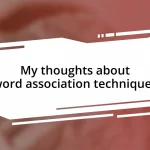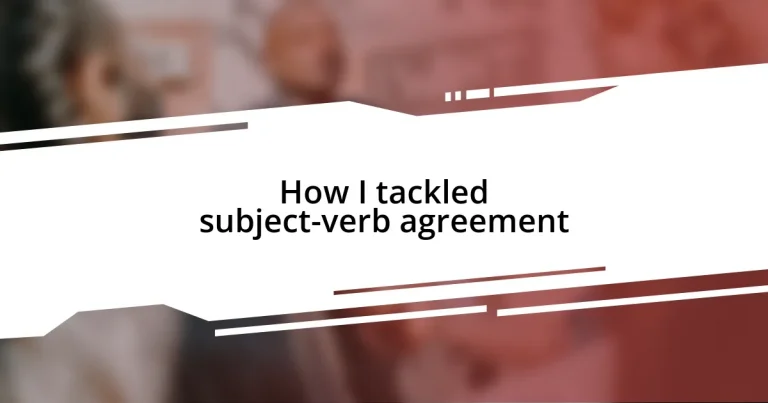Key takeaways:
- Subject-verb agreement is essential for clarity in writing, with specific rules for phrases like “a number of” (plural verb) versus “the number of” (singular verb).
- Common pitfalls include misunderstanding indefinite pronouns as singular, collective nouns that can take singular or plural verbs, and the impact of interrupting phrases on subject identification.
- Effective strategies for mastering subject-verb agreement involve breaking down sentences, rephrasing, and focusing on the main idea to avoid confusion.
- Practicing agreement through fill-in-the-blank exercises, reading, and seeking feedback from others can significantly enhance writing skills.
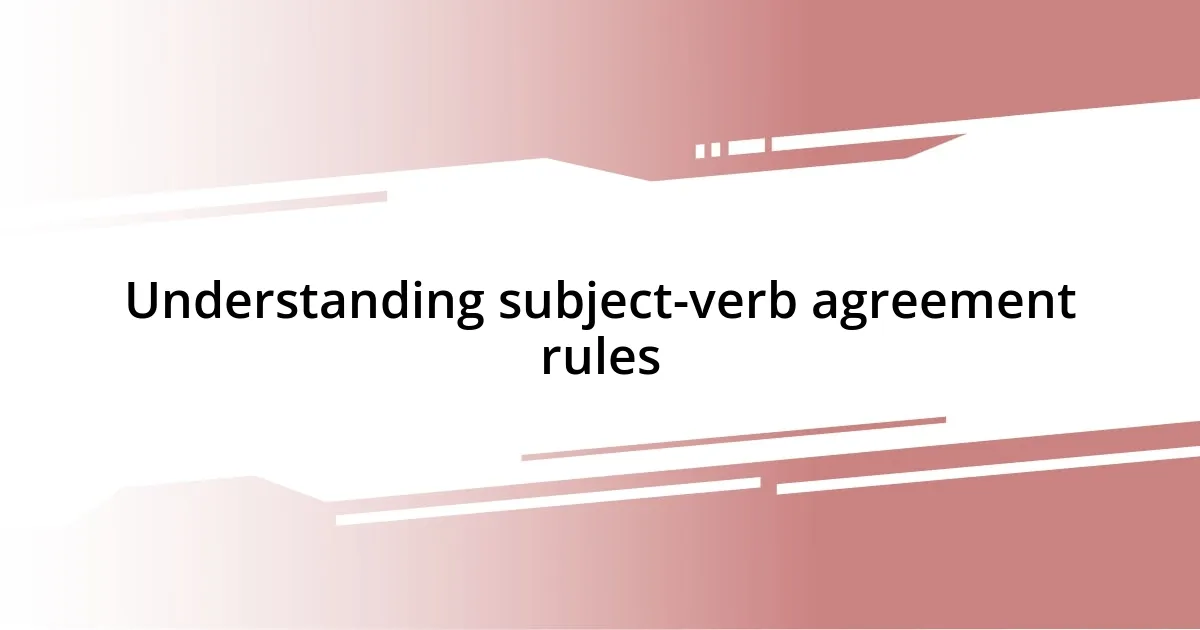
Understanding subject-verb agreement rules
Subject-verb agreement can feel tricky at first, but it’s all about ensuring that the subject and verb in a sentence match in number. For instance, I remember when I first started writing essays; I often confused singular and plural nouns. It was a bit embarrassing to realize the errors, but making those mistakes ultimately helped me learn.
One rule that stood out to me is that when using phrases like “a number of,” the verb should be plural—”a number of students were late.” On the flip side, “the number of” takes a singular verb—”the number of students is growing.” Have you ever found yourself caught in these nuances? I know I have, and it’s these little details that can make a significant difference in clarity.
Another aspect is recognizing how collective nouns function. For instance, I once wrote “the team are winning,” but correctly it should be “the team is winning,” because I viewed the team as a single unit. Understanding these subtleties can transform not only how we write but also how we communicate. It’s exciting when everything clicks and you see how these rules enhance your writing!

Common pitfalls in subject-verb agreement
One common pitfall I’ve encountered with subject-verb agreement is with indefinite pronouns. For instance, I used to incorrectly say, “Everyone are invited to the party.” That mistake was both humbling and eye-opening when I realized that “everyone” is singular and should take a singular verb: “Everyone is invited to the party.” It’s a subtle yet significant distinction that can slip by if you’re not paying close attention.
Another tricky area is when we deal with sentences that include phrases between the subject and the verb. For example, I once wrote, “The bouquet of flowers were fresh.” Seeing that sentence on paper, I felt a twinge of confusion, but ultimately it was clear that the subject was “bouquet,” which is singular! Here are some common pitfalls to be mindful of:
- Indefinite pronouns (e.g., everyone, anyone, nobody) are always singular.
- Phrases and clauses that interrupt the subject can mislead you but don’t change the subject’s number.
- Collective nouns (team, family, group) usually take a singular verb unless the focus is on the individuals within the group.
- Titles of works (books or movies) may seem plural but are treated as singular.
- Phrasal constructions, like “a number of” requiring plural verbs, can lead to errors if you confuse them with similar phrases.
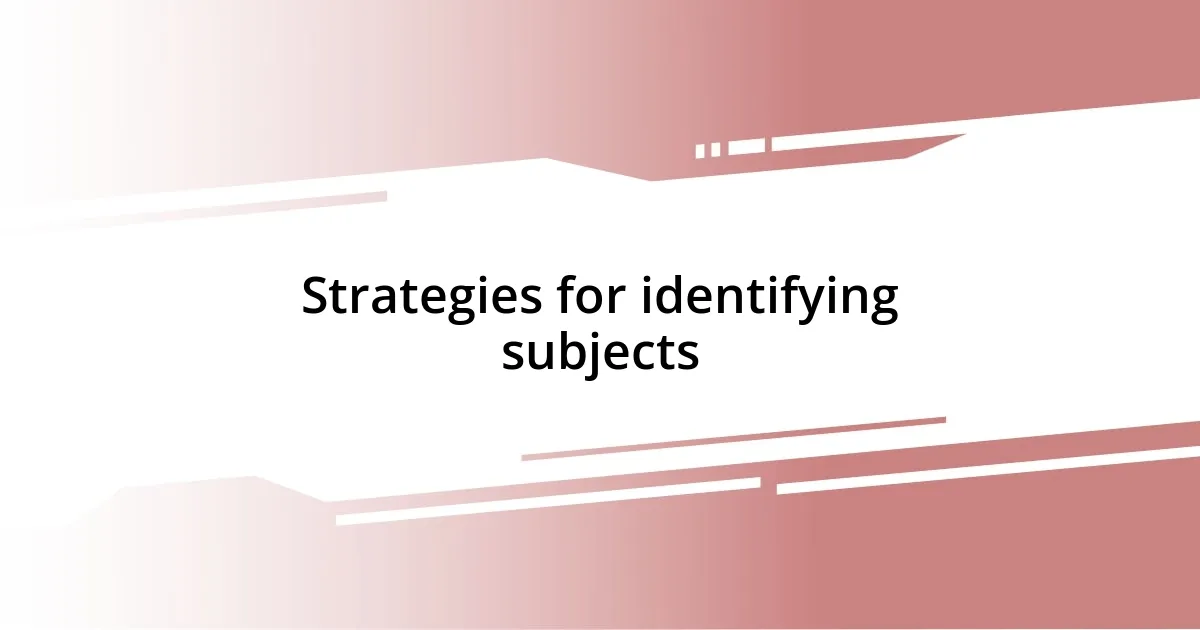
Strategies for identifying subjects
I often find that breaking down a sentence can illuminate the subject lurking in plain sight. Take, for example, the sentence “The dog, along with its puppies, bark loudly.” At first glance, I might focus on the phrase “along with its puppies” and mistakenly think “dog” is plural. But really, the subject here is “dog,” and spotting that requires patience and a keen eye.
One strategy that’s worked wonders for me is rephrasing sentences. When I say, “The group of friends are planning a trip,” I can mentally swap it to “The friends in the group are planning a trip.” Instantly, it’s clearer that “group” is the subject and singular! This technique has helped clarify confusing constructions for me, particularly when conjunctions or prepositional phrases seem to muddle the waters.
Another useful approach is to identify the main idea of the sentence. I remember grappling with sentences like “The committee meets every week.” Here, the focus is on the committee as one cohesive unit, prompting me to use a singular verb. It’s amazing how understanding the core of what you’re expressing can streamline the writing process and enhance clarity.
| Strategy | Description |
|---|---|
| Breaking Down Sentences | Focus on identifying the main subject, disregarding phrases that might mislead you. |
| Rephrasing Sentences | Change the structure to clarify the subject, making the singular/plural distinction clearer. |
| Identifying Main Ideas | Determine the core subject of the sentence to ensure proper verb agreement. |
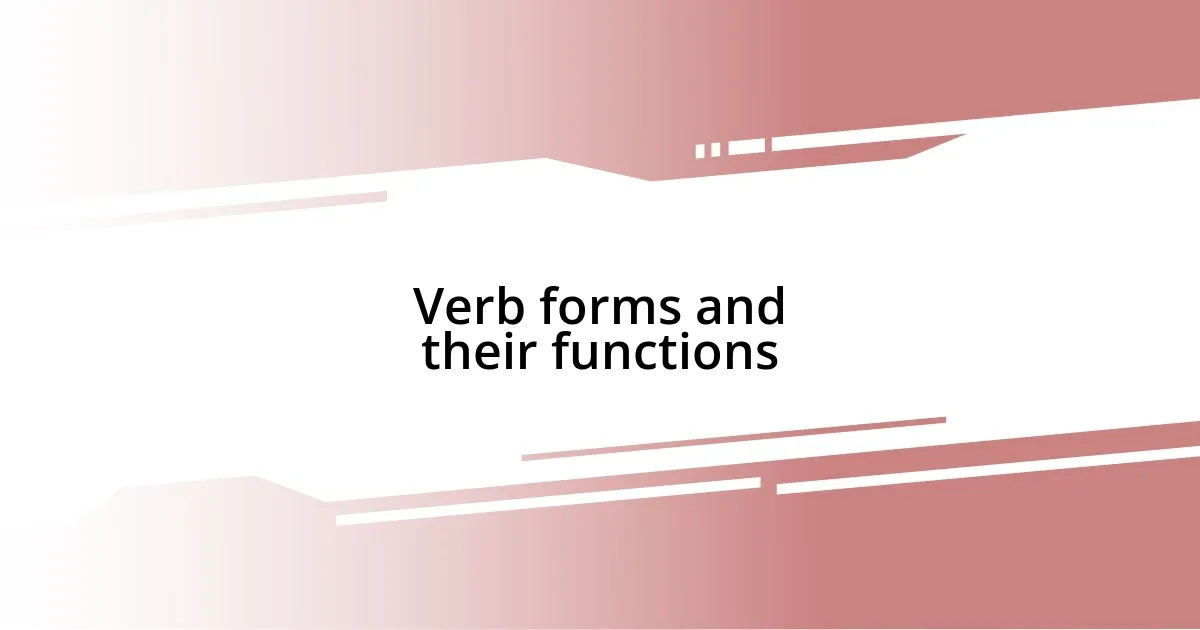
Verb forms and their functions
Understanding verb forms is crucial for effective writing. The different forms of verbs serve specific functions that can shape the meaning of our sentences. For instance, I remember grappling with verb tenses during my early writing days. In a sentence like “She runs every morning,” the verb “runs” suggests present action, while “ran” would indicate a completed action in the past. This distinction isn’t just academic; it changes how we convey time and meaning, which can impact how a reader interprets our message.
I’ve noticed that verbs also vary in their forms to express mood or voice. For example, using “was running” instead of “ran” adds a continuous aspect to the action, creating a more vivid picture in the reader’s mind. This subtle shift in verb forms can transform mundane descriptions into engaging narratives. Have you ever felt that excitement when a verb choice enhances the emotion of your writing? I certainly have, and it encourages me to explore verbs with more intention in my own work.
In my experience, recognizing and using auxiliary verbs can really elevate the effectiveness of my sentences. These helping verbs—like “is,” “are,” “was,” and “will be”—aid in constructing more complex tenses and moods, allowing for greater expression. I once wrote, “They will be celebrating their anniversary,” and felt that it added so much depth compared to just saying “They celebrate.” This layering of meaning is what makes writing compelling and connects the audience to the emotional undercurrents of the narrative.
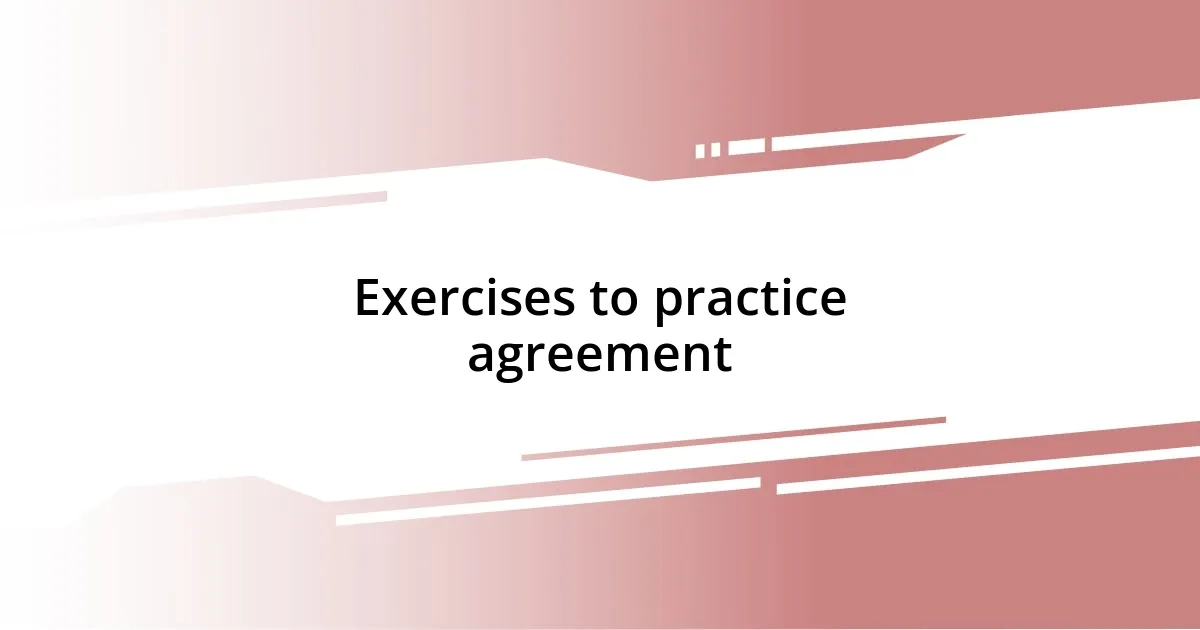
Exercises to practice agreement
One of my favorite exercises to practice subject-verb agreement is to create fill-in-the-blank sentences. For instance, I might write something like, “The team _ (is/are) winning this season.” Completing this exercise helps reinforce the idea that “team” is a singular noun, requiring the singular verb “is.” It’s simple, yet I often found myself second-guessing and would appreciate how practice made perfect over time.
Another effective method involves reading through various texts and identifying the subjects and verbs. I remember poring over a novel, noting sentences like, “The flock of birds _ (fly/flights) overhead.” While it was great to enjoy the story, I also had fun catching these nuances. This dual activity not only enriched my reading experience but also sharpened my understanding of agreement in real-time.
Lastly, I love working with a partner on agreement exercises. We would take turns correcting each other’s sentences, discussing why certain choices were made. It brought a layer of collaboration that made learning fun and engaging, kind of like a friendly competition! Have you ever tried this approach? It’s amazing how quickly you pick up grammatical rules when someone else is watching.
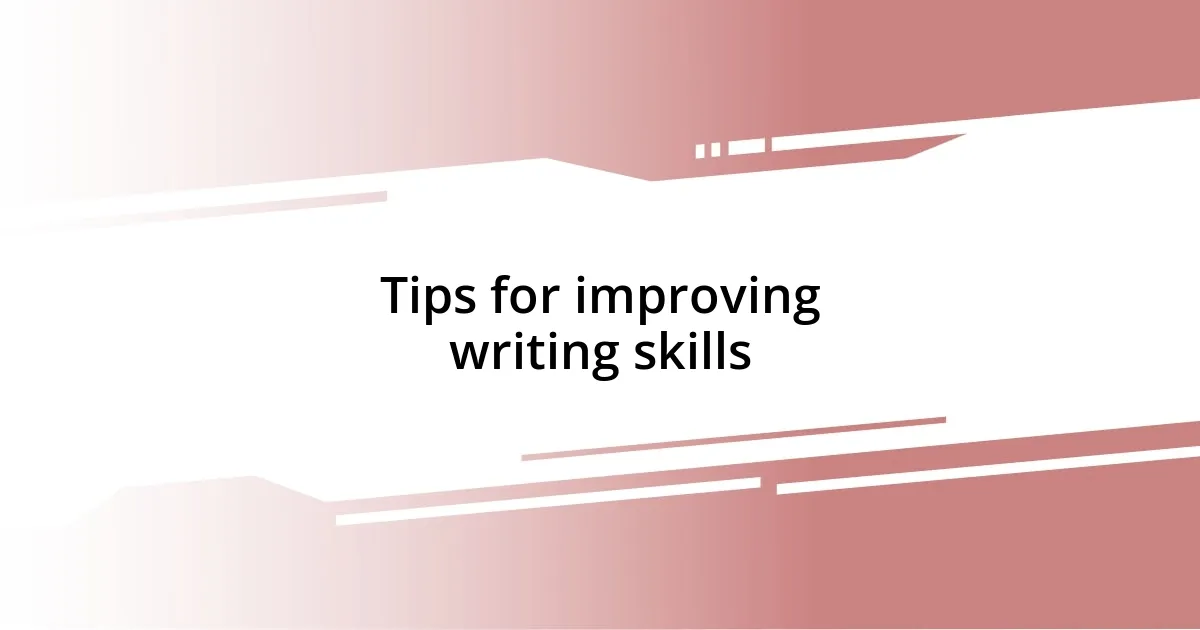
Tips for improving writing skills
Improving writing skills takes dedication and practice, but there are enjoyable ways to enhance your abilities. One technique that really worked for me was keeping a journaling habit. Initially, I didn’t expect much, but I found the more I wrote, the easier it became to express my thoughts clearly. Reflecting on my entries allowed me to catch mistakes and refine my style. Have you ever noticed how writing regularly can uncover your unique voice?
Another tip I swear by is reading widely. Dive into different genres, from fiction to non-fiction, poetry to articles. Each piece offers a fresh perspective on word choice, syntax, and rhythm. I still remember picking up a stunning novel that shifted my understanding of dialogue. The way the characters spoke revealed their personalities while teaching me the importance of tone. By absorbing diverse writing styles, you can cultivate your own.
Lastly, don’t shy away from seeking feedback. I learned so much from sharing my work with friends and family. Their fresh insights often highlighted areas I overlooked. I still cherish a moment when a friend pointed out a particularly awkward sentence in my story—and after revising it, the flow improved dramatically. Collaborating and discussing writing not only enhances skills but also builds confidence. So, have you shared your work with someone lately? You might be surprised by the growth that comes from it.
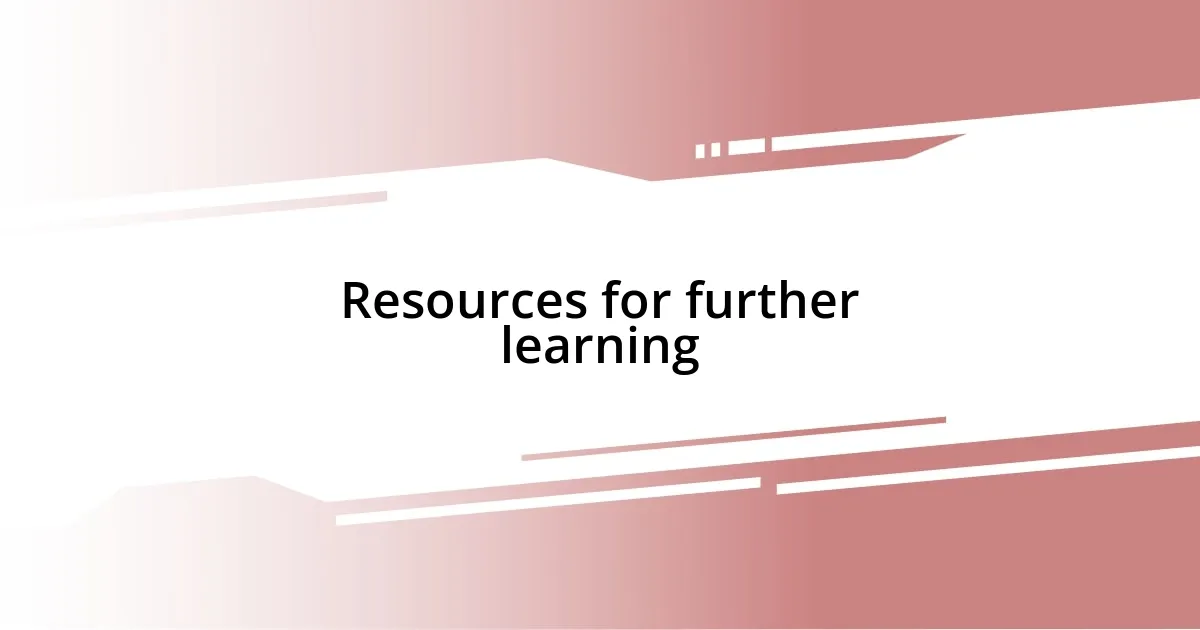
Resources for further learning
When it comes to expanding your knowledge on subject-verb agreement, I found a few resources that truly stood out. Online platforms like Grammarly and Purdue OWL offer excellent explanations and exercises tailored for all levels. I remember using Grammarly during a stressful late-night writing session, and its instant feedback was a game-changer—I could see my mistakes right then and there, helping me learn in real time.
Another gem I discovered is the book The Elements of Style by Strunk and White. It’s a concise guide that not only addresses grammatical nuances like subject-verb agreement but also excels in teaching clarity and brevity. As I read through the chapters, I often found myself marking passages that resonated with my journey. Have you ever felt that surge of understanding while connecting with a favorite book? It can be invigorating and motivating to see concepts laid out so clearly!
You might also want to check out YouTube channels focused on grammar. I’ve gained valuable insights from quirky creators who blend humor with education. It’s easy to get lost in their engaging explanations, and I often find myself chuckling while learning. Isn’t it delightful when education feels more like fun? I genuinely believe that mixing enjoyment with learning can solidify your understanding of concepts like subject-verb agreement.






